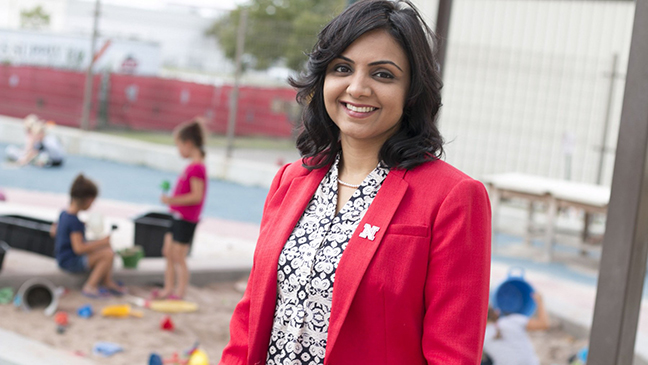
Dev identifies barriers and strategies to engage parents about nutrition
06 Nov 2017 By Brad Stauffer
Engaged parents are critical to raising successful children, and child care providers can be an important conduit for parent education that can make a difference in the lives of children. Nutrition education is a good example. But research led by Dipti Dev, assistant professor of Child, Youth and Family Studies, has found that some child care providers do not feel confident educating parents.
Dev interviewed full-time child care providers from varying contexts to get their perspectives about communicating with parents about their child’s nutrition. These in-depth, face-to-face interviews were conducted at licensed center-based child care programs and Head Start programs in Central Illinois.
Dev used benchmarks from the Academy of Nutrition and Dietetics to quiz participants about communicating with parents about nutrition. Benchmarks included working with parents to assure food brought to centers by parents met nutritional guidelines; and that providers talk with parents about nutrition education that takes place in the child care program.
Two main themes emerged from the study that was published earlier this year in the “American Journal of Health Promotion:” barriers to communication; and strategies for building a bridge to effectively communicate with parents about their child’s nutrition.
“This study was not about whether providers were communicating with parents or not, but rather how the providers felt about communicating,” said Dev. “We went deeper to understand the barriers and to explore what strategies are most useful.”
One of the biggest barriers, said Dev, was providers’ fear of parents’ negative reaction when talking to them about their child’s nutrition. This was especially prevalent for providers who ran their own businesses. Many felt that parents viewed them primarily as babysitters, and if they tried to educate parents about nutrition that they would lose business.
The study also found that child care center policy could make a difference in the quality of nutrition children received. For example, Head Start providers don’t have to battle parents bringing unhealthy food, because Head Start policy prohibits outside food.
“The main implication is that there has to be a respectful relationship between providers and parents,” said Dev. “Early childhood is a foundational period that requires this partnership between caregivers and parents for the healthy development of children.
“As professionals,” says Dev, “we need to empower providers by giving them the knowledge and tools to feel confident in communicating with parents.” She says programs offered to child care providers through Nebraska Extension are a good example of how researchers can impact practice and make a difference for children.
Several strategies to better promote children’s health through parental nutrition education emerged from the interviews. They included:
- Recognizing the benefits of communicating with parents about nutrition
- Building a partnership with parents though education
- Leveraging policy to communicate positively and avoid conflict
- Implementing center-level practices to reinforce policies
Colleagues contributing to the study and publication were Courtney Byrd-Williams, University of Texas School of Public Health, Austin Regional Campus, Austin, TX; Samantha Ramsey, School of Family and Consumer Sciences, University of Idaho, Moscow, ID; Brent McBride, Department of Human Development and Family Studies, University of Illinois at Urbana–Champaign, Champaign, IL; Deepa Srivastava, Department of Child, Youth and Family Studies, University of Nebraska–Lincoln; Ashleigh Murriel, Division of Nutrition, Physical Activity, and Obesity, National Center for Chronic Disease Prevention and Health Promotion, CDC, Atlanta, GA; Chrisa Arcan, Family, Population, and Preventive Medicine at Stony Brook University, NY; and Anna M. Adachi-Mejia, Health Promotion Research Center at Dartmouth, Norris Cotton Cancer Center, Lebanon, NH.
College of Education and Human Sciences
Child, Youth and Family Studies